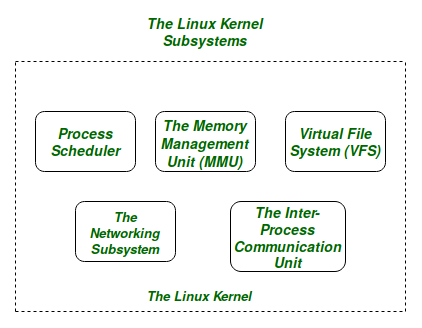Kernel ek operating system (OS) ka core component hota hai. Yeh OS ka sabse bottom layer hota hai aur directly hardware ke sath interact karta hai. Kernel ka mukhya kaam hardware resources (jaise CPU, memory, disk, aur peripherals) ko manage aur control karna hota hai, taki user-level applications ko sahi tarah se work karne mein madad mil sake. Niche, main kernel ke kuch important aspects aur functions ko explain kar raha hoon:
Kernel in Linux in hindi – Linux notes in hindi:-
Aaj iss post me janenge ki linux me kernel kya hota hai kitne type ke hote hain , Architecture kya hota hai, Hardware Abstraction kya hota hai, Process Management, Memory Management, File System Management, Device Drivers, System Calls kya hota hai or janenge ki Advantages kya hote hain, Disadvantages kya hota hain Features kya kya hain or uske uses kya hain jangenge aaju hum iss post me hindi me.
- Hardware Abstraction: Kernel hardware abstraction layer provide karta hai, jisse user-level applications ko specific hardware details se nahi matlab rakhna padta hai. Hardware ko abstract karke, kernel applications ke liye ek consistent aur unified interface provide karta hai.
- Process Management: Kernel process management ka kaam karta hai. Yani ki, jab aap kisi application ko run karte hain, to kernel us application ko ek process ke roop mein create karta hai. Kernel processes ko schedule karta hai, multitasking ko support karta hai, aur CPU time share karta hai.
- Memory Management: Kernel memory management ka bhi zimmedar hota hai. Yeh hardware memory ko allocate, deallocate, aur manage karta hai. Ismein virtual memory management bhi shamil hoti hai, jisse multiple processes ek saath chal sakte hain.
- File System Management: Kernel file system management ko handle karta hai. Yani ki, files aur directories ko create, read, write, aur delete karne ke liye kernel file system operations ko manage karta hai. Ismein file permissions, file access, aur disk space allocation bhi shamil hoti hai.
- Device Drivers: Kernel mein device drivers shamil hote hain, jo hardware devices ke saath communication karne ke liye zaroori hote hain. Device drivers specific hardware components ko recognize karte hain aur unke saath interaction karne ke liye APIs provide karte hain.
- System Calls: Kernel system calls ko support karta hai. System calls user-level applications ko kernel ke services ka access dene mein madad karte hain. Examples of system calls include file operations, network communication, aur memory management.
- Security: Kernel security ka bhi ek important aspect hai. Yeh user-level applications ko isolate rakhta hai aur unauthorized access se bachata hai. File permissions, user authentication, aur process isolation kernel ke security features hote hain.
- Communication: Kernel inter-process communication (IPC) ko support karta hai, jisse ek process dusre process ke saath data share kar sake.
- Networking: Kernel networking ka bhi control rakhta hai. Yani ki, network protocols, socket management, aur network devices ko control karke data transfer aur communication ko facilitate karta hai.
Kernel ek operating system ka heart hota hai, jo user-level applications ke liye essential services aur resources provide karta hai. Iska role OS ke overall performance, stability, aur security mein crucial hota hai. Linux, Windows, macOS, aur dusre popular operating systems mein bhi apne kernels hote hain, jo specific OS ke requirements ko meet karte hain.

Advantages of Kernel in Linux in hindi – Linux notes in hindi:-
Linux kernel ke kuch key advantages hai jo isse ek powerful operating system banate hain:
- Open Source: Linux ka kernel open source hai, matlab iska source code kisi bhi vyakti dwara dekha, modify aur redistribute kiya ja sakta hai. Isse developers ko flexibility milti hai apne requirements ke anusar kernel ko customize karne mein.
- Stability: Linux kernel ka design aur development process stability ko madhya mein rakhta hai. Iska matalab hai ki Linux operating system ka kernel bahut kam crash hota hai aur reliable performance deta hai.
- Security: Linux kernel ka ek important advantage hai uski security. Kernel mein bahut sare security features hote hain jo unauthorized access, malware aur attacks se bachate hain. Iski wajah se Linux operating system ko secure mana jata hai.
- Scalability: Linux kernel ko aasani se alag-alag tarah ke devices aur systems par scale kiya ja sakta hai. Isse chote embedded devices se lekar supercomputers tak ke systems par Linux ka istemal kiya ja sakta hai.
- Hardware Support: Linux kernel mein wide range ka hardware support hota hai. Iska matalab hai ki Linux operating system ko bahut sare devices aur components ke sath use kiya ja sakta hai.
- Performance: Linux kernel ka design high performance ke liye optimized hota hai. Isse Linux operating system fast response times aur efficient resource utilization provide karta hai.
- Community Support: Linux kernel ka development ek bada community ke dwara kiya jata hai jo ki developers, users, aur contributors se mil kar banta hai. Isse Linux kernel ko regular updates aur improvements milte rahte hain.
Ye the kuch key advantages jo Linux kernel ko ek popular aur powerful operating system banate hain.

Disadvantages of Kernel in Linux in hindi – Linux notes in hindi:-
Linux kernel ke kuch disadvantages bhi hain, jinmein se kuch niche diye gaye hain:
- Compatibility: Linux kernel ke sath kuch proprietary software aur hardware compatible nahi hota. Kuch companies apne drivers aur software ko Linux ke liye develop nahi karte, isse compatibility issues ho sakte hain.
- Learning Curve: Linux kernel ka use karne ke liye user ko Windows ya MacOS se thoda alag tarah ka interface aur commands seekhne padte hain. Isse initial learning curve ho sakta hai jo kuch users ke liye challenging ho sakta hai.
- Driver Support: Windows ke comparison mein, Linux kernel ka hardware driver support kam hota hai. Kuch devices ke liye drivers alag se install karna pad sakta hai, jo user ke liye thoda cumbersome ho sakta hai.
- Software Availability: Linux ke liye kuch specific software aur games available nahi hote jo Windows aur MacOS ke liye hote hain. Isse kuch users ko apne preferred software ko Linux par use karne mein pareshani ho sakti hai.
- Fragmentation: Linux kernel ke kai distributions (distros) hote hain jaise Ubuntu, Fedora, CentOS, etc. Har distribution apne features aur package management system mein thoda farak hota hai, isse ecosystem mein fragmentation aa sakti hai.
- Support: Linux kernel ka official support nahi hota, isliye kuch users ko issues resolve karne mein thodi pareshani ho sakti hai. Iske liye mostly community forums aur documentation ka sahara lena padta hai.
Yeh the kuch disadvantages jo Linux kernel ke sath judi hui hain. Har user ke liye inka impact alag ho sakta hai, aur kuch users ke liye yeh disadvantages unke requirements aur preferences par depend karta hai.
Features of Kernel in Linux in hindi – Linux notes in hindi:-
Linux kernel ke kuch key features hai jo isse ek powerful operating system banate hain:
- Multitasking: Linux kernel ka design multitasking ko support karta hai, matlab ek samay mein multiple tasks ko handle kar sakta hai. Isse users ko ek smooth multitasking experience milta hai.
- Multiuser: Linux kernel multiuser environment ko support karta hai, matlab ek hi system par multiple users ka account hona. Har user apne files aur settings ko alag-alag manage kar sakta hai.
- Virtual Memory: Linux kernel virtual memory concept ko implement karta hai, jisse system ko lagta hai ki uske paas physical memory se zyada memory available hai. Isse system performance improve hoti hai aur large applications ko handle karne mein madad milti hai.
- File System Support: Linux kernel supports multiple file systems jaise ext4, Btrfs, XFS, etc. Isse users ko flexibility milti hai apne data ko store aur manage karne mein.
- Networking Support: Linux kernel mein robust networking support hota hai, jisse users ko networking features ka istemal karne mein madad milti hai. Isme TCP/IP networking, firewalling, routing, aur network device support shaamil hai.
- Security Features: Linux kernel mein bahut sare security features hote hain jaise access control, encryption, secure boot, aur auditing. Isse Linux operating system ko secure banate hain.
- Open Source: Linux kernel open source hai, jisse users ko freedom milti hai code ko dekhne, modify karne, aur redistribute karne ki.
- Scalability: Linux kernel ko alag-alag types ke systems par scale kiya ja sakta hai, jaise ki embedded devices, desktops, servers, aur supercomputers. Isse Linux ek versatile operating system banata hai.
- Community Support: Linux kernel ka development ek large community ke dwara kiya jata hai, jisse regular updates, bug fixes, aur new features milte rahte hain. Isse Linux kernel ko continuously improve kiya ja sakta hai.
Ye the kuch key features jo Linux kernel ko ek powerful aur versatile operating system banate hain.

Uses of Kernel in Linux in hindi – Linux notes in hindi:-
Linux kernel ka use ek complete operating system banane ke liye hota hai. Iska matalab hai ki Linux kernel ek base provide karta hai jise developers aur distributions use karke apne specific operating system ko build karte hain. Linux kernel ke kuch key features aur uses niche diye gaye hain:
Features:
- Multiuser: Linux kernel multiuser environment ko support karta hai, jisse ek hi system par multiple users ka istemal kar sakte hain.
- Multitasking: Linux kernel multitasking ko support karta hai, jisse multiple tasks ko parallel execute kiya ja sakta hai.
- Virtual Memory: Linux kernel virtual memory ko manage karta hai, jisse system ke overall performance aur stability improve hoti hai.
- File System Support: Linux kernel various file systems ko support karta hai jaise ext4, Btrfs, XFS, jisse data ko store aur manage kiya ja sakta hai.
- Networking Support: Linux kernel me networking support built-in hota hai, jisse network communication possible hoti hai.
- Device Drivers: Linux kernel me bahut sare device drivers built-in hote hain, jo ki hardware ko support karte hain.
- Security: Linux kernel me security features built-in hote hain jaise access control, encryption, firewall support, jo system ko secure banate hain.
Uses:
- Desktop Operating Systems: Linux kernel ka use desktop operating systems ke liye hota hai jaise Ubuntu, Fedora, CentOS, etc.
- Server Operating Systems: Linux kernel server operating systems ke liye bhi use hota hai jaise Red Hat Enterprise Linux (RHEL), CentOS, Ubuntu Server, etc.
- Embedded Systems: Linux kernel ko embedded systems me bhi use kiya jata hai jaise smartphones, IoT devices, routers, etc.
- Supercomputers: Linux kernel ka use supercomputers aur high-performance computing ke liye bhi hota hai.
- Networking Devices: Linux kernel ko networking devices jaise routers, switches, firewalls me bhi use kiya jata hai.
Yeh the kuch key features aur uses jo Linux kernel ko ek versatile aur powerful option banate hain operating systems ke liye.

